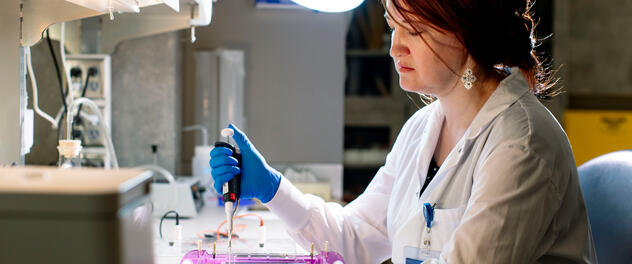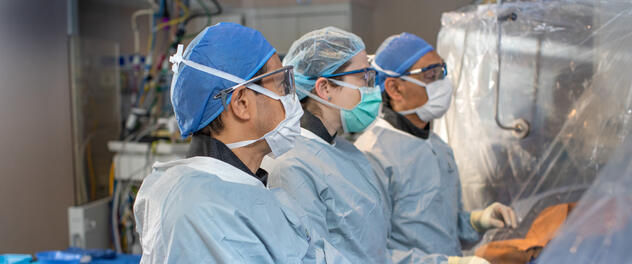-

SCAD description and management
The Mayo Clinic SCAD Research Program uses data from Mayo Clinic's SCAD Registry to find patterns among participants with confirmed SCAD and to recommend the best ways to manage and treat it.
-

SCAD and fibromuscular dysplasia
Mayo Clinic SCAD researchers are working to learn how often changes in arteries such as FMD take place and find the best ways to screen for them.
-

Mental health after SCAD
It's common to have mental health issues after a heart attack, and SCAD is a particularly unique and disruptive type of illness. The Mayo Clinic SCAD Research Program is studying ties between SCAD and depression, anxiety and PTSD in people who have survived SCAD.
-

SCAD and reproductive health
Researchers are studying several relevant topics, including the role of the sex hormones in SCAD.
Research Overview
Studies carried out in Mayo Clinic's SCAD Research Program involve:
- Looking at medical records and imaging data.
- Listening to and learning from patients' stories.
- Examining physical samples.
- Tracking participants over time.
- Collecting new data, such as novel imaging and physiological information.
These methods help the research team collect detailed information about participants' mental and physical health and study risk factors for them to have SCAD again.
Ongoing recruitment, data analysis and reporting
The SCAD Research Program has been well received by patients and healthcare professionals. In response, the research team has sped up its research activities to meet demand, bringing in new research personnel and collaborators at Mayo and beyond.
Collecting health information from participants is critical to breaking down and analyzing data. The SCAD Research Program continues to work with participants and their healthcare teams to complete their medical histories. The research team is still using social media, referrals from healthcare professionals and other methods to recruit participants.
The information that the research team gathers from participants' medical records and stories is crucial to all projects in the SCAD Research Program. It is particularly important to projects focused on:
Genetic research
To populate the DNA and plasma biobank, the SCAD Research Program performs DNA sequencing on samples provided by patients with SCAD and one or both of their parents. DNA sequencing reveals participants' genetic information based on the order of the chemicals in their DNA. The research team is analyzing the samples with a long-term goal of finding changes in genes that cause SCAD. These changes may be passed down from a person's family or happen spontaneously in that person.
Abnormalities of other arteries in patients with SCAD
Abnormalities may occur in arteries other than those that deliver blood to the heart — for example, in the femoral artery in the leg or the carotid artery in the neck.
Sometimes, patients in the SCAD Clinic have had physical exams or medical imaging — for reasons not related to SCAD — that have shown that the patients have various types of arterial abnormalities. These include:
Therefore, Mayo Clinic SCAD experts recommend that patients consider having vascular imaging as part of their medical evaluations to find any vascular conditions that could occur along with SCAD.
The SCAD Research Program is studying past and future imaging done at Mayo Clinic and by participants' local healthcare teams. The program's goal is to better understand the cause of SCAD, help with patient follow-up and find out how these other arterial abnormalities affect outcomes.
Learn more about SCAD and other arterial abnormalities, such as FMD.
Coronary artery imaging
The leaders of Mayo's SCAD Research Program have extensive experience in interpreting coronary artery imaging in patients with SCAD. Clinical findings suggest that the hearts and blood vessels of people with SCAD may be built differently than those of other people. Those differences may make the vessel walls more likely to split. These differences may be like those found in patients with FMD.
The research team is working to find these differences, as they may provide clues to what's causing SCAD. They also may help show which people are at higher risk of having SCAD again.
The research team has developed a unique way to use CT imaging to find FMD and other arterial abnormalities that is convenient for patients. It requires the smallest possible amounts of contrast, radiation, time and cost. While doing this research, the SCAD Research Program aims to balance risks, such as radiation and contrast, with accuracy and cost.
Learn more about the program's work on SCAD CT imaging.
SCAD and mental health concerns
Depression, anxiety and sometimes PTSD are common after a heart attack. In addition to lowering patients' quality of life, these symptoms are related to a higher risk of later cardiac events.
The SCAD Research Program is studying whether these mental health concerns are more common among patients with SCAD than among patients who don't have heart disease. The research team also is looking at mental health concerns in people who've had SCAD compared with people who have heart attacks due to atherosclerosis, which are better understood and more easily treated.
Learn more about post-SCAD mental health.
SCAD and reproductive health
The SCAD Research Program is focused on how sex hormones affect when SCAD occurs and how serious it is. Researchers are studying people who had SCAD while they were pregnant or shortly after. They are working to understand how pregnancy relates to how serious SCAD is as well as outcomes when people have SCAD around the time of giving birth. The research team aims to help patients and their healthcare teams make more-informed decisions about pregnancy when SCAD is a factor.
In addition to studying SCAD and pregnancy, the SCAD Research Program is exploring other topics related to sex hormones. These include how SCAD is related to menstrual flow, menopause, birth control and hormone replacement therapy. The research team also is studying the differences between men and women who have had SCAD.
Learn more about SCAD and reproductive health.
SCAD and neurovascular function
A clinical trial at Mayo Clinic is studying the role of the neurovascular system in SCAD. The study compares the fight-or-flight response, also known as sympathetic function, and arterial health, including how the arteries are built and how they work. The study compares participants who have had SCAD with participants of similar ages and sexes who haven't had SCAD.
Contact the SCAD Research Program to learn more about taking part in the study.
The future of SCAD research at Mayo Clinic
Early findings from clinical care and research have led to multiple substudies. The SCAD Research Program team at Mayo Clinic has grown to include:
- Emergency Department physicians.
- Exercise physiologists.
- Geneticists.
- Internal medicine and cardiology trainees.
- Internists.
- Interventional and noninvasive cardiology specialists.
- OB-GYNs.
- Pathologists.
- Psychologists and psychiatrists.
- Radiologists.
- Rheumatologists.
- Vascular medicine specialists.
The team's early observations have raised many new questions and set the stage for numerous studies. Such studies may pull information from patients' histories or follow them into the future. Researchers may study clinical symptoms of and treatments for SCAD. Or they could investigate the genes related to SCAD. Ongoing and future studies and projects in Mayo Clinic's SCAD Research Program may include:
- Improving the patient experience for SCAD diagnosis and follow-up.
- Optimizing cardiovascular rehabilitation after SCAD.
- Managing SCAD in the short-term and over longer periods of time.
- Studying pregnancy and SCAD.
- Connecting menopause, hormones and SCAD.
- Using noninvasive imaging in SCAD diagnosis and follow-up, including finding the best techniques to reduce exposure to radiation.
- Using imaging to study the features of the hearts and arteries of patients with SCAD.
- Finding changes in single genes related to SCAD — both changes that happen on their own and those passed down from your family.
- Learning how genetics may influence your risk of SCAD.
- Finding out how other medical conditions such as COVID-19, mental health and arrhythmias relate to SCAD.
- Identifying risk factors for having SCAD again and ways to prevent it from coming back.
- Improving short- and long-term outcomes for patients with SCAD.
- Understanding FMD and other diseases of the arteries.
Ultimately, the goal of Mayo's SCAD Research Program is to create and lead studies that follow patients through time as well as multicenter trials. This research aims to improve patient outcomes through better diagnostic tools. It leads toward strategies for the best treatment when the initial heart attack occurs. And it helps develop treatments to prevent SCAD from happening, helps patients recover when it does happen and keeps it from coming back.
SCAD Discoveries and Research